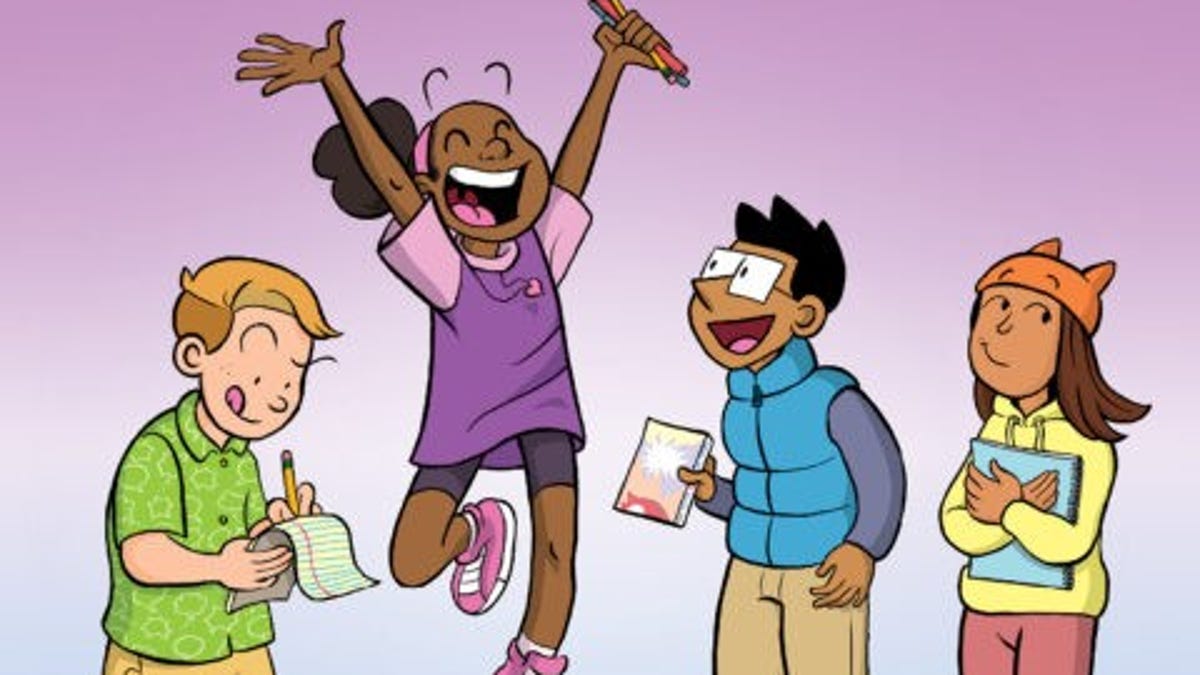In a world where kids can become anything, Raina Telgemeier and Scott McCloud are hoping they become cartoonists.
Telgemeier has become a household name for parents whose kids love her graphic novels “Smile” and “Drama.” She’s been called “The Beatles for children.” But decades ago, she was the kid in grade school with an interest no one else liked.
Her dad noticed her burgeoning talent for cartoons and gave her a copy of “Understanding Comics” by Scott McCloud, a 1993 history and how-to guide. Now, McCloud and Telgemeier have teamed up to publish a new how-to manual for younger kids. With “The Cartoonists Club” (Scholastic, ages 8-12, out now), kids don’t have to feel like Telgemeier did when she was young.
“To be able to give kids something that gets them on that path a little sooner has always been the goal. And kids always ask me anyway. They want tips, they want advice, they want tricks,” Telgemeier tells USA TODAY. “Once I realized no one was going to do it if I didn’t, I thought who better to ask to collaborate with me than the creator of ‘Understanding Comics’ himself?”
In ‘Cartoonists Club,’ librarians and parents are ‘true superheroes’
“The Cartoonists Club” is both a story and a manual – it has both practical, fun exercises for kids (like learning what “plewds” are) and a lovable band of characters who form a deep friendship around comics.
Supporting the after-school club is the school library’s media specialist, Ms. Fatima, who plays a crucial role in teaching and encouraging the young cartoonists. McCloud and Telgemeier say the character is an “amalgam of the amazing librarians that we have met over the last couple of decades.” It’s fitting, then, that the authors kicked off this week as honorary chairs for the American Library Association’s National Library Week, visiting libraries across the country amid sweeping federal cuts from the Trump administration.
Not only are school libraries crucial third spaces for kids to “be silly” and make friends, McCloud and Telgemeier say, but librarians and teachers can be the difference between a kid pursuing their passion or getting discouraged and giving up.
“Just like Ms. Fatima, I had teachers and librarians who understood that work, who understood the value of comics and so I was very lucky that way,” McCloud says. “I’m always cognizant of the fact that not everybody is so lucky to have a Ms. Fatima.”
McCloud and Telgemeier are intimately familiar with the “naysayers” – adults who think cartoons are something to grow out of. But graphic novels are a method of storytelling, the book reminds, and that has no expiration date. In “The Cartoonists Club,” one character’s father is originally dismissive of his son’s passion, calling it “childish.”
“I wanted to offer just a little bit of perspective for that guy, that parent, whoever that is, who sees that their kids love comics and they’re like ‘Eh, it’s not my thing, I don’t really care.’ We want the parent to join the kid in reading the book,” Telgemeier says. She adds, “There’s nothing dumbed down about what kids’ books are. Kids’ books are really sophisticated and they’re really thought-provoking.”
How to draw cartoons: It’s okay to make mistakes and be messy
As the kids in “The Cartoonists Club” prepare for a big comic book conference, they learn plenty of tips and life lessons for drawing and collaborating. Telgemeier says she encourages parents to embrace and make space for boredom to spawn creativity.
The kids also play a teamwork game called “Quanto Comics.” They learn how to make “minicomics” that can be done quickly on just a single sheet of paper. Both are easy for readers to mimic in real life.
In one scene, shy and talented Lynda feels frustrated that her friends can churn out drawings quickly while she spends all her time trying to get a single drawing right. Ms. Fatima and the group help her “mess up” her drawing, teaching her to embrace early, imperfect doodles.
“Blank pages also kinda scare me. What if I ruin them with all my mistakes?” Lynda says in the book. Her friend Howard replies: “Perfect is for robots. Mistakes are where the people are!”
“The message of the book isn’t even just it’s okay to make mistakes – I think we’re almost encouraging kids to make some mistakes on purpose,” McCloud says.
Raina and Scott worked together on ‘Cartoonists Club’: Now they want kids to collaborate too
Neither Telgemeier nor McCloud has co-authored a book of this magnitude. It was a learning experience on compromising and borrowing techniques, not unlike what the kids learn in their club. McCloud, a meticulous planner, praised Telgemeier’s style of discovering the story as you go along.
“It’s really hard to tell where Raina ends and Scott begins,” Telgemeier says. “But that’s the way we wanted it.”
It’s what the characters learn in the book, and also what Telgemeier and McCloud hope kids will learn off the page, too: Stories work better when we tell them together. Telgemeier recalls her own experience of sharing her vulnerable autobiographical comics with people for the first time. Like the character Lynda, she sheepishly refused to share her work because she was “striving for perfection.” But when Lynda opens up her sketchbook and shows her classmates the deeply personal story, they see her more fully.
“That’s one of the beautiful things about writing and art is it makes people feel less alone because they could see themselves on the page,” Telgemeier says. “And maybe that means they can see themselves making something too.”
Clare Mulroy is USA TODAY’s Books Reporter, where she covers buzzy releases, chats with authors and dives into the culture of reading. Find her on Instagram, subscribe to our weekly Books newsletter or tell her what you’re reading at [email protected].

Leave a Reply